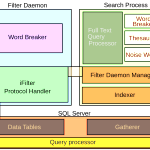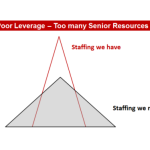
CIO vs. the owner of an IT consulting firm
CIOs or organizations and owners of small consulting firms are usually people of the same age group (education, interests etc.). Yet a comparison between them reveals some interesting patterns which in turn  explain some of the conflicts that arise between them. In a corporate culture that extensively promotes outsourcing of IT to consulting firms both organizations (IT in the company) and the consulting firm play similar overlapping roles – usually complimenting or supplementing each others staff.
explain some of the conflicts that arise between them. In a corporate culture that extensively promotes outsourcing of IT to consulting firms both organizations (IT in the company) and the consulting firm play similar overlapping roles – usually complimenting or supplementing each others staff.
What they sell
You’d imagine that both the Consulting firm and the CIO sell IT services to business. That is largely true however the Consulting firm is usually selling hours of an expert consultant whereas the CIO is typically selling business value. The profits of a project for a consulting firm are dependent on how accurately they can estimate and execute the use of hours. How well they can line them up in a continuous segment and how they can avoid rework. The CIO/the company however usually cares only about the business value that the end product delivers. This is why you find CIOs usually tracking metrics like uptime and business value addition whereas consulting firm management is tracking data like employee billable hour utilization.
Focus and perspective on technology
Technology is usually an interest for the CIO. They usually have a broad perspective and reach out to other experts for depth. Technology, in and of itself, generates no value to them unless it is applied to the specific problems of their business. For the IT consulting firm however technology and knowledge thereof is bread and butter. They key value proposition is usually centered around technology expertise and you can often see mechanisms of preserving and developing these knowledge assets (training, templatization, hiring etc).
Industry Focus
Along the same lines as mentioned above, IT consultants will usually align themselves with technology more than the industry. This is particular true in the early part of their inception/careers. The word “retail” means something very different in the banking sector than in the Wholesale and Retail industry. The Enterprise CIO will usually expect the consultant to “get it” but they are usually a few steps behind. The same thing happens on the other end where consultants will sometimes talk about technology trends as common notion but the enterprise is lagging behind/not interested.
Relationships
Consulting firm usually view relationships in terms of $ earned or $ expected earning. Projects in the pipeline, probability of getting them are typical metrics. CIOs understand this and will usually exchange this for lower rates, flexibility or assurance of longevity (for support and maintenance). Relationships usually don’t last long unless they consider both aspects.
The difference in perspectives can be a positive symbiotic addition to each other’s strengths or it can be a source of conflict – this depends entirely on how parties build relationships. In my opinion successful IT vendor relationships are centered around a mutual respect for each other’s world view. What causes friction between your partner/your enterprise clients? Please share with your story with us in the comments section.

![[New Post] What are the 5 things that Internet of Things will trigger?](https://alliedc.com/wp-content/uploads/2015/03/IoT-150x150.png)




![[Infographic] What are the 4 Basic Layers of an IoT Service Oriented Architecture?](https://alliedc.com/wp-content/uploads/2015/03/IoT-4-Layers-of-SOA-2-150x150.png)